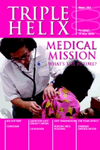She walked into the antenatal clinic looking the picture of health. It was her first visit and I was recording her details. At 26 years of age she was expecting her first baby and was excited at the thought of being a mother. 'Have you had any serious illness in the past', I asked. 'Oh yes', she said, 'I've had a heart transplant.' Four years previously she had contracted a viral illness that rapidly led to severe cardiomyopathy and heart failure. Following the quick and fortuitous finding of a compatible donor, she underwent heart transplant surgery. After making a full recovery, she was told that she could live a 'normal life' and had now decided to start a family.
She was monitored carefully throughout her pregnancy. A close eye was kept on the baby too, who developed normally. She was allowed to go into spontaneous labour at term and she had a normal delivery of a healthy baby girl. Mother and baby were well when last I saw them several months later.This was a patient who made me think. She was grateful to be alive but she knew that she would have to stay under the close eye of a physician and take her immunosuppressive medication daily for the rest of her life. She needed to avoid contact with infection, which could prove fatal. She also knew she was taking a risk in getting pregnant. She was alive only because, at just the right time, someone died and provided her with a new heart.
The Bible tells us that we all have a serious heart condition that is beyond hope of cure. The prophet Ezekiel foretold that one day God would give us 'a new heart'[1] and Paul tells us that 'at just the right time'[2] Jesus came into the world to do just that, bringing us new life through his death. My patient had undergone costly surgery. The new heart Jesus offers comes as a free gift.
Living the Christian life means we too need to maintain a close relationship with Jesus, the very best of physicians, but how many of us are 'grateful to be alive' and make the effort to maintain and develop that relationship? How many of us neglect the daily 'medicine' we need: time spent in prayer, reading God's word and in fellowship with other Christians? How much effort do we make to avoid the things that do us harm? Deliberately putting ourselves in harm's way by the company we keep, the things we read or the TV programmes we watch can be asking for trouble. Peter reminds us, 'Whoever would love life and see good days must ... turn from evil and do good'.[3]
Finally, I was impressed by the fact that despite experiencing such trauma, my patient was still willing to take risks to bring a new life into the world. God asks that we too should be prepared to risk our comfort and even our lives if we are to be fruitful in our service of him. This was a lady who taught me a lot.
































